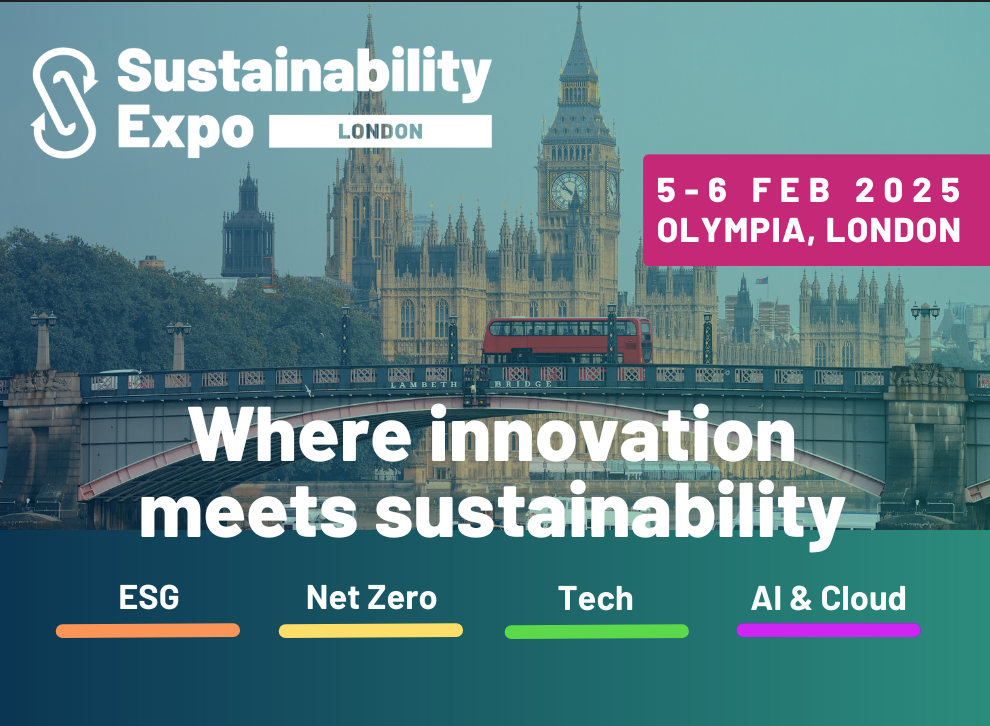
AccountCarbon at the Sustainability Expo
At TechEx Global 2025, AccountCarbon attended the Sustainability Expo, where industry leaders from Bupa, Haleon, and Resonate AI shared groundbreaking insights on carbon footprinting, carbon accounting, and sustainable business practices. Key themes focused on leveraging technology, cloud computing, artificial intelligence (AI), and supply chain engagement to drive meaningful carbon reduction.
With increasing regulatory and stakeholder pressure, businesses must embrace carbon footprinting and accurate carbon accounting to remain competitive. Let’s explore the key takeaways from the event.
Haleon: Using Technology to Drive Sustainability
Haleon, a consumer health company spun out of GSK, is at the forefront of technology-driven sustainability, focusing on reducing carbon emissions through cloud computing, IT infrastructure, and employee engagement.
Innovative Carbon Reduction Strategies by Haleon
Haleon has introduced practical steps to minimise carbon emissions:
- Cloud Migration with a Sustainability Focus – Moving cloud computing workloads to regions where electricity generation is less carbon-intensive helps reduce overall emissions.
- Smarter IT Hardware Management – Instead of following a fixed global refresh cycle, Haleon uses usage data to extend the lifespan of hardware.
- Mobile Device Strategy – Phasing out work-issued mobile phones in favour of Mobile Device Management (MDM) SIM solutions reduces electronic waste.
- Energy Efficiency at Work – Encouraging employees to limit unnecessary devices (e.g. multiple monitors at home) and ensuring all equipment is powered down after hours conserves energy.
- Employee-Led Sustainability Initiatives – Hosting hackathons to crowdsource sustainability ideas fosters innovation and engagement.
Driving Organisational Change in Carbon Accounting
One of the biggest challenges in carbon accounting is securing internal buy-in. Haleon highlighted the importance of:
✅ Clear Sustainability KPIs – Setting measurable carbon reduction targets.
✅ Stage-Gate Approach – Breaking down goals into manageable milestones.
✅ Defined Responsibilities – Assigning clear ownership at each stage of execution.
By aligning technology with carbon accounting, businesses can quantify, track, and reduce emissions effectively.
Bupa: Reducing Carbon Through the Supply Chain
Bupa is leading the way in carbon footprinting across supply chains, recognising that supplier engagement is essential for sustainability success.
Key Carbon Reduction Strategies from Bupa
- Sustainable Cloud Computing – Migrating to the cloud should be done strategically. Instead of a simple “lift and shift”, businesses should re-architect workloads for optimal energy efficiency.
- Supplier Carbon Commitments – Bupa has set a target for 75% of its suppliers to have net-zero commitments, either through Science-Based Targets (SBTi) or the Race to Zero initiative.
- AI Optimisation for Energy Efficiency – While AI is energy-intensive, it can also support sustainability by:
- Using pre-trained models to reduce computational energy.
- Minimising model sizes to lower energy demand.
- Scheduling high-processing AI tasks when electricity grids are greenest.
Carbon Accounting & Supplier Engagement
A major challenge in carbon footprinting is tracking emissions across the supply chain. By embedding carbon accounting into procurement policies, businesses can push suppliers to adopt net-zero targets and monitor their progress.
🔑 Key takeaway: Sustainability is a collective effort—companies must hold suppliers accountable to achieve real carbon reductions.
Resonate AI: Best Practices for Carbon Footprinting & Reporting
Resonate AI emphasised that carbon footprint reporting must be:
✅ Clear
✅ Comprehensive
✅ Consistent
✅ Transparent
Why Accurate Carbon Footprinting Matters
With 47% of corporate sustainability reports facing scrutiny or criticism, businesses must ensure their carbon emissions reporting is accurate and credible.
Beyond Compliance: The Business Case for Carbon Accounting
Many companies view carbon footprinting as merely a compliance task, but there are several business benefits:
- Attracting Top Talent – Today’s workforce wants to work for sustainable companies. Businesses with strong carbon accounting and sustainability plans will attract and retain high-calibre employees.
- Competitive Advantage – Transparent carbon footprinting builds customer trust and strengthens B2B partnerships.
- Regulatory Readiness – Governments and investors are tightening sustainability reporting requirements. Businesses with robust carbon accounting systems will stay ahead.
Blockchain in Carbon Footprinting: A Game-Changer
One of the most exciting discussions at TechEx Global 2025 was how blockchain technology is revolutionising carbon footprinting.
Blockchain ensures:
🔹 Data Integrity – Prevents greenwashing and manipulated figures.
🔹 Transparency – Allows consumers and investors to verify sustainability claims.
🔹 Traceability – Enables businesses to track emissions from raw materials to final products.
By integrating blockchain into carbon accounting, businesses can enhance accountability and credibility in sustainability reporting.
The UN Global Compact: A Framework for Sustainability
Another key discussion focused on the UN Global Compact, a voluntary initiative based on 10 sustainability principles.
Why Join the UN Global Compact?
- Provides a structured framework for carbon footprinting and sustainability.
- Offers guidance on aligning business practices with global sustainability goals.
- Connects companies to a network of 21,000+ organisations committed to sustainability.
Businesses serious about carbon accounting and emissions reduction should consider joining the UN Global Compact to align with global best practices.
Final Thoughts: The Future of Carbon Footprinting & Carbon Accounting
The Sustainability Expo at TechEx Global 2025 delivered a clear message:
🌍 Carbon footprinting and carbon accounting are no longer optional—they are essential for business success.
Key Takeaways for Businesses:
✔️ Technology – Optimise cloud computing, AI, and IT systems for sustainability.
✔️ Supplier Engagement – Set clear carbon reduction targets for vendors.
✔️ Accurate Reporting – Ensure transparency, consistency, and compliance in carbon footprinting.
✔️ Blockchain Integration – Use blockchain for reliable carbon accounting.
✔️ Employee & Stakeholder Buy-In – Engage employees, suppliers, and partners in sustainability efforts.
Companies that take a proactive approach to carbon footprinting will:
✅ Reduce costs
✅ Enhance stakeholder trust
✅ Future-proof their business
💡 Are you ready to take action? Start implementing sustainable practices today and become a leader in carbon accounting and emissions reduction. Contact us today.

Leave a Reply